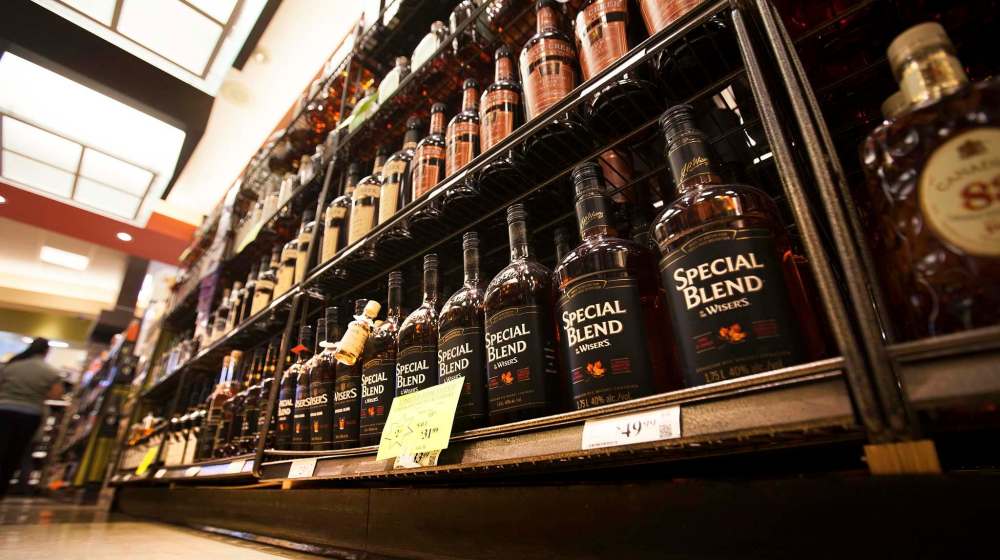Liquor Mart has plans to offer delivery through website: booze Crown corp.
Advertisement
Read this article for free:
or
Already have an account? Log in here »
To continue reading, please subscribe:
Monthly Digital Subscription
$19 $0 for the first 4 weeks*
- Enjoy unlimited reading on winnipegfreepress.com
- Read the E-Edition, our digital replica newspaper
- Access News Break, our award-winning app
- Play interactive puzzles
*No charge for 4 weeks then billed as $19 every four weeks (new subscribers and qualified returning subscribers only). Cancel anytime.
Read unlimited articles for free today:
or
Already have an account? Log in here »
Hey there, time traveller!
This article was published 26/07/2016 (2828 days ago), so information in it may no longer be current.
Some big changes will be coming to Manitoba Liquor Marts in the next two years.
By April, Manitoba will fall in line with most of Canada and have minimum prices for all alcohol and beer.
Manitoba Liquor & Lotteries plans to follow Ontario’s lead in the next two years and begin online ordering and delivering booze from its Liquor Marts to customers’ doorsteps.

The move toward minimum pricing will mean about 20 products — ranging from spirits to coolers — will see an increase in price at retail stores, officials with the Crown corporation said.
The move will target booze sold at a cheap price, with a high alcohol percentage.
This follows in the footsteps of Manitoba’s neighbours to the east and west: both Saskatchewan and Ontario have had minimum prices in all categories for years. Alberta is the only province that doesn’t set minimum prices for beer or alcohol.
Currently, only single serve and packaged beer is subject to a minimum price in Manitoba.
Meanwhile, the Liquor Control Board of Ontario launched online sales Tuesday with a website that lets people choose from nearly 5,000 products and have them delivered to their home or a nearby liquor store.
There is a $50 minimum for any purchases through LCBO.com and purchases could be delivered to a neighbourhood LCBO store for free, or to a customer’s home through Canada Post for a $12 fee, plus tax.
Liquor & Lotteries said Wednesday its vision when it launchedliquormarts.ca was to eventually accept and deliver online orders.
“This is still our plan, and we expect to be able to offer online ordering from liquormarts.ca in about two years,” spokeswoman Andrea Kowal said.
As for minimum pricing, Saskatchewan first brought in minimum pricing, also known as social reference pricing, for all categories in 2010 as a means to deter the abuse of cheap alcohol.
Jim Engel, the vice-president of corporate services at the Saskatchewan Liquor and Gaming Authority, said about 35 products of the 2,200 sold by the Crown corporation had a “significant” increase in price, while about 100 products had a minor increase.
Fortified wines and cheap beer with a high alcohol percentage were the most targeted products.
A list of the specific products was not available.
In Saskatchewan, the average retail price increase for affected beer products was $2.28 or 39 per cent (1.18 litre package).
Affected wine products increased on average by $3.19 or 30 per cent (750 ml bottle) and affected ciders and wine cooler products increased on average by $1.36 or 16 per cent (two-litre bottle).
“What we were targeting, in particular, were a few products that were in the marketplace, which relative to their peer group, were very high alcohol content and very low price,” Engel said.
“The logic is basically to mitigate some of the harm that comes out of excessive alcohol consumption by targeting products.”
The products that were targeted had a decrease in sales in the first year by 60 per cent for beer and 20 per cent for other products, Engel said.
“A couple of inner-city community associations did tell us, and this is largely anecdotal, from their view the initiative was successful in that it lowered the severity and frequency of extremely intoxicated people in their inner city neighbourhoods,” Engel said.
Advocates against substance abuse have long called for this measure, which has been lauded as a means to deter the abuse of cheap booze by chronic drinkers, explained Tim Stockwell, the director of the Centre for Addictions Research of British Columbia.
“There are many, many virtues to this approach. One is mainly from a health and safety perspective. There is good Canadian and international evidence that this pricing model reduces deaths caused by alcohol, hospital admissions and costs, and also alcohol-related crimes and road crashes,” Stockwell said.
“The people who suffer a little bit are the small proportion of drinkers who are heavy drinkers and like to drink cheap alcohol because they drink a lot of it, so they are drinking on a budget.
“We know one of the reasons this works is because it targets the heaviest drinkers.”
In Manitoba, the implementation is part of a strategy to reduce alcohol-related harms. It will be implemented April 1, 2017.
The price will be determined by a complicated calculation that factors in the percentage of alcohol and absolute volume in a product.
Officials at Liquor & Lotteries said they are finalizing the strategy on minimum pricing and could not give details about which products would be increased in price increase or by how much.
— with files from the Canadian Press
kristin.annable@freepress.mb.ca
History
Updated on Wednesday, July 27, 2016 7:53 PM CDT: Updates headline


